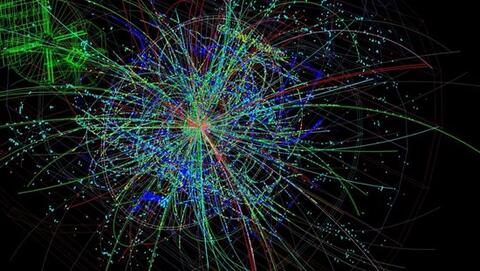
M2 - Nuclei, particles, astroparticles and cosmology (NPAC) course
The NPAC program trains students for research in nuclear physics, particle physics, astroparticle physics and cosmology. Its aim is to prepare students for experimental or theoretical thesis work in major research organizations such as the CNRS, universities or the CEA.
This course covers fundamentals of the physics of the infinitely small and the infinitely large. On the one hand, students study the physics of elementary particles, their fundamental interactions, their assembly into atomic nuclei and the properties of these nuclei. On the other, students work on understanding the universe, its geometry, as well as its dark matter and dark energy content. Students also learn about cosmic messengers such as astroparticles, which may also provide answers to some of these unanswered questions.
The course covers scientific themes that are currently booming. In particle physics, CERN's proton-proton collider, the LHC, has recently produced major results with the discovery of the Higgs boson (Nobel Prize 2013). In cosmology and astroparticles, the search for dark energy and dark matter represents a major scientific challenge for years to come, and a Nobel Prize was awarded in 2011 for advances in this field. Nuclear physics is also in full swing, with the start-up of SPIRAL 2, a gas pedal that should, among other things, enable us to understand the origin of elements and their abundance on Earth.
Tomorrow's research needs researchers trained in the themes of the NPAC program. The NPAC program has many advantages in this respect: it is closely linked to the research world. All the teaching staff are cutting-edge researchers, and students spend time in the laboratories, doing internships or studying the work of researchers, particularly in instrumentation. Indeed, these research subjects require increasingly powerful and sophisticated instruments, whose performance determines the progress of the discipline. The course therefore includes an instrumental component, both in the field of gas pedals and detectors.
Additionally, students will have several opportunities to learn about the researcher's approach. In the first semester, they spend a month working in pairs on a project. They must conduct a simple experiment, from design to set-up and analysis of results. This enables them to acquire knowledge of instrumentation, data analysis and detection techniques. The "Detectors" course also includes a first immersion in a research team. For four half-days, pairs of students visit laboratoires where they are hosted by researchers and engineers working on an experiment under construction. At the end of these meetings, students are asked to produce a bibliography, a report and an oral presentation.
The internship completes this training, which naturally leads to a doctorate the following year.
This training program is recognized for its quality by all IN2P3 laboratories (Institut de Physique Nucléaire et de Physique des Particules of the CNRS) in the Paris region and elsewhere in France, as well as in laboratories with related subjects (astrophysics institutes, theoretical physics laboratories, etc.).
At the end of the training program, 90% of students go on to a doctorate with funding. Host laboratories are located in the Paris region, in the provinces or abroad.
Skills and professional objectives
- The training of researchers likely to play an active role (data analysis, simulation, reconstruction) in high-energy physics experiments;
- The training of researchers and/or general engineers with the technical skills to lead high-level research and development projects for future detectors, whether for nuclear, particle or astroparticle physics experiments;
- The training of researchers and/or engineers capable of modeling a scientific problem, in both industrial and institutional settings
Job opportunities
Students taking this pathway will be able to tackle both experimental and theoretical thesis work in the field covered by the specialization.
Typically, at the end of the thesis, a large half of the graduating class joins the public research sector (University, CNRS, CEA), while the other half is recruited by industry.
Organization
In the first semester, students follow courses divided into three majors and two minors between October and the end of January. Four of these courses provide fundamental knowledge. The fifth offers instrumentation skills. This is supplemented by a four-week laboratory course in September.
In the second semester, students follow an intensive advanced course in the field they have chosen for their thesis. They also have a course and a mini-internship in computer science, focusing on their future field of research. Students then complete an internship in a research laboratory as part of the team with which they plan to carry out their future thesis work. This internship is assessed by a jury after a defense, taking into account the opinion of the representative of the supervising team.
Target audience
This course is open to students who have completed the first year of a master's degree in physics, as well as holders of a physics-based engineering diploma. In all cases, a thematic focus on fundamental physics in France or abroad is desirable.
A solid basic knowledge of quantum mechanics and statistical physics is recommended. Advanced knowledge in at least one of the fields listed in the course title is desirable.
For Sorbonne University M1 students, the "Nuclear and Particle Physics" major is virtually indispensable. The "Classical Field Theory" or "Energetic Radiation Detection" courses in S1 and "Symmetries in Physics" in S2 are also recommended.
Admission
Selection is based on an application and an interview with the course leaders.
Generally, a graduating class comprises thirty students. Its composition is based on a balance between first-year master's students and students from the Grandes Ecoles. It also benefits from the admission of students from other countries.
Contacts
Responsable
Delphine HARDIN (LPHNE)
Responsable
Eli BEN HAIM (LPNHE)
Contact administratif
Valérie BOILLEVIN